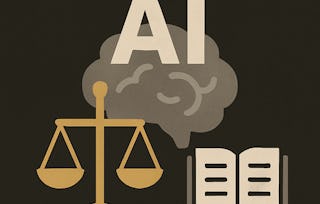Computing systems and technologies fundamentally impact the lives of most people in the world, including how we communicate, get information, socialize, and receive healthcare. This course is the first of a three-course sequence that examines ethical issues in the design and implementation of computing systems and technologies and reflects upon the broad implication of computing on our society. It covers ethical theories, privacy, security, social media, and misinformation.

Computing, Ethics, and Society Foundations

Computing, Ethics, and Society Foundations
This course is part of Computing, Ethics, and Society Specialization

Instructor: Bobby Schnabel
3,347 already enrolled
Included with
20 reviews
Recommended experience
What you'll learn
Identify and manage ethical situations that may arise in their careers.
Understand and be able to apply ethical frameworks to help them analyze ethical challenges.
Identify some of the main ethical issues that arise in the use of the internet, including privacy, security, and the impacts of social media.
Describe key issues related to misinformation on the internet
Skills you'll gain
- Ethical Standards And Conduct
- Artificial Intelligence
- Responsible AI
- Media and Communications
- General Data Protection Regulation (GDPR)
- Information Technology
- Security Awareness
- Social Impact
- Information Privacy
- Data Ethics
- Personally Identifiable Information
- Computer Security Awareness Training
- Cybersecurity
- Skills section collapsed. Showing 7 of 13 skills.
Details to know

Add to your LinkedIn profile
5 assignments
See how employees at top companies are mastering in-demand skills

Build your subject-matter expertise
- Learn new concepts from industry experts
- Gain a foundational understanding of a subject or tool
- Develop job-relevant skills with hands-on projects
- Earn a shareable career certificate

There are 4 modules in this course
In this introductory week, you will delve into the fascinating world of computing, ethics, and society. You will explore the fundamental concepts of ethics and ethical frameworks, providing a solid foundation for the entire course. You will gain insights into key ethical theories, including Kantianism, Virtue Ethics, Utilitarianism, and Social Contract Theory. Through interactive discussions and engaging resources, you will understand how these theories shape our moral decision-making processes and their significance in the context of computing technologies.
What's included
6 videos13 readings2 assignments1 peer review1 discussion prompt
This week explores the internet's evolution and the ethical challenges of recommender systems and internet advertising. You examine recommender systems' operation, benefits, and ethical concerns, and broader issues in internet advertising such as personalized advertising and data usage on browsers and social media platforms. Through discussions and independent assessment of current articles, you will critically assess the ethics of online recommendations and advertising, gaining a comprehensive understanding of ethical considerations related to core aspects of the internet.
What's included
5 videos8 readings1 assignment1 peer review2 discussion prompts
This week explores two key areas related to the internet: the influence of social media on youth and the widespread issue of misinformation in different contexts. You will analyze ethical responsibilities related to fostering a healthy digital environment and understanding and combating misinformation. This week aims to equip you with the knowledge and insights needed to contribute to the creation of a responsible online environment, and to a society that is better informed about major internet-related ethical issues.
What's included
6 videos9 readings1 assignment1 peer review1 discussion prompt
This week delves into the concepts of computer privacy and security. You will explore privacy issues such as data collection, tracking, and anonymity, alongside legal approaches to safeguarding privacy such as the “Right to be Forgotten”. The module also covers security topics including types of security breaches, ransomware, and ethical hacking. By the end of this week, you will have a broad understanding of computer privacy and security, equipped with ethical insights to navigate this dynamic landscape responsibly.
What's included
8 videos13 readings1 assignment1 peer review2 discussion prompts
Earn a career certificate
Add this credential to your LinkedIn profile, resume, or CV. Share it on social media and in your performance review.
Build toward a degree
This course is part of the following degree program(s) offered by University of Colorado Boulder. If you are admitted and enroll, your completed coursework may count toward your degree learning and your progress can transfer with you.¹
Instructor

Offered by
Explore more from Algorithms
 Status: Free Trial
Status: Free TrialUniversity of Colorado Boulder
 Status: Free Trial
Status: Free TrialUniversity of Colorado Boulder
 Status: Free Trial
Status: Free TrialUniversity of Colorado Boulder
 Status: Preview
Status: PreviewUniversity of Colorado Boulder
Why people choose Coursera for their career

Felipe M.

Jennifer J.

Larry W.

Chaitanya A.

Open new doors with Coursera Plus
Unlimited access to 10,000+ world-class courses, hands-on projects, and job-ready certificate programs - all included in your subscription
Advance your career with an online degree
Earn a degree from world-class universities - 100% online
Join over 3,400 global companies that choose Coursera for Business
Upskill your employees to excel in the digital economy
Frequently asked questions
To access the course materials, assignments and to earn a Certificate, you will need to purchase the Certificate experience when you enroll in a course. You can try a Free Trial instead, or apply for Financial Aid. The course may offer 'Full Course, No Certificate' instead. This option lets you see all course materials, submit required assessments, and get a final grade. This also means that you will not be able to purchase a Certificate experience.
When you enroll in the course, you get access to all of the courses in the Specialization, and you earn a certificate when you complete the work. Your electronic Certificate will be added to your Accomplishments page - from there, you can print your Certificate or add it to your LinkedIn profile.
Yes. In select learning programs, you can apply for financial aid or a scholarship if you can’t afford the enrollment fee. If fin aid or scholarship is available for your learning program selection, you’ll find a link to apply on the description page.
More questions
Financial aid available,

